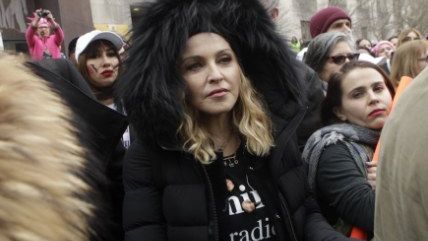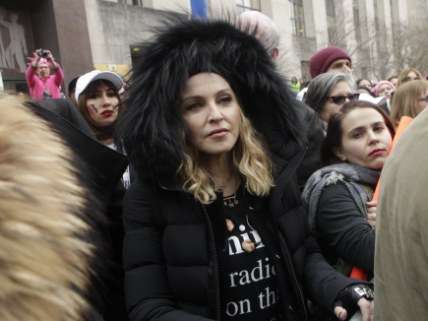Let's Avoid Fake Outrage over Madonna's Violent White House Fantasy
Safe spaces for me, but not for thee.


For proof that the snowflake tendency runs as deeply among Trumpites as it does among campus censors, look no further than the Madonna controversy.
Yes, the dowager duchess of pop, the 58-year-old who sings about being a "girl gone wild," has let her mouth land her in hot water again. Her speechcrime this time? To admit in public that she fantasized about blowing up the White House after Trump won it.
In an otherwise typically Madonna speech at the Women's March in Washington, D.C. — all "fuck you"s and "look-at-me"s — she said she had "thought an awful lot about blowing up the White House." She thought better of it, though, and decided it would be more effective to challenge Trump with a "revolution of love" and through her music. Ick. Maybe the blowing-up wouldn't have been so bad after all.
The outrage was instant and predictable. The right-wing bits of Twitter went into meltdown. This was incitement to violence, they said. Breitbart got stuck in, whipping its readers into a Twitter-frenzy with reports on Madonna's "profanity-laced speech" and claims that her violent remarks are going to be investigated by the Secret Service (it's not clear whether this is true.)
Then came the talking heads. Brit blowhard Piers Morgan charged Madonna with going beyond mere "rudeness" and instead saying something "incredibly offensive"—to which we might wonder what's wrong with being incredibly offensive. He accused her of "fueling an idea" to "assassinate" Trump. "Publicly threatening to blow up the White House is a serious criminal offence", he said, and "Madonna should be arrested."
Newt Gingrich was up next. He told Fox & Friends that Madonna is part of "an emerging left-wing fascism"—get a grip, Newt—and "she ought to be arrested." The inevitable petition wasn't far behind. There's always someone who wants to Change.org out of existence an idea or image they find offensive. So far 6,500 people have signed the petition calling on the Department of Justice to "Arrest Madonna for Making Threats Against the White House."
Here's the thing that these pearl-clutching wailers and tweeters, these right-leaning Safe Spacers don't seem to understand: Madonna made no threat to blow up the White House. Nor did she incite anyone else to. She merely talked about a fantasy she had had.
She "thought an awful lot" about blowing up the White House. She thought it. To arrest her for this would be to arrest her for committing a thoughtcrime, for imagining something. It would be as mad as arresting her for her murder of that bloke in the movie Body of Evidence, which she also didn't really do—that, too, was a fantasy, an image.
What next? Arrest film directors who have used CGI to depict the White House being destroyed? Feel the collar of anyone who's written fiction about the killing of a president? After all, those fantasies might also trigger some hothead to do something he shouldn't. Maybe all stories and dreams and thoughts of doing harm to politicians should be outlawed.
We shouldn't only defend Madonna because she didn't actually "threaten to blow up the White House," as the possibly illiterate Morgan put it. We should also defend her because heated speech, hyperbolic speech, even violence-tinged speech, is a legitimate part of political discourse and should remain absolutely free.
There was a Supreme Court ruling that put this very well. In Watts vs the United States in 1969, the justices said that political talk often includes "vehement" and "unpleasantly sharp" attacks on public officials and even forms of criticism that sound violent but which are really just crude or super angry.
They were ruling on the 1966 case of a young man who was convicted of knowingly threatening an individual's life—the President's—during a rally in D.C. against police violence, when he said: "They always holler at us to get an education. And now I have already received my draft classification… and I have got to report for my physical this Monday coming. I am not going. If they ever make me carry a rifle the first man I want to get in my sights is L.B.J." The Court threw the conviction out, ruling that it was not a realistic threat to kill President Johnson but was merely a "crude" way of expressing "political opposition to the President."
And so it is with Madonna. She was crudely stating political anger. She was expressing political exasperation in an unfiltered way. We must have space in the political realm for crudeness and nastiness and stupidity and all the rest.
Of course genuine incitement to violence, where you use words knowing that they could imminently and directly contribute to the physical harming of an individual, is not a free-speech issue. But violent fantasies are. Violent thoughts are. Violent-inducing speech is not a free-speech issue, but violent-sounding speech—"I could kill that son of a bitch," "I thought about blowing up the White House"—is. Feminists should bear this in mind. Some of them are defending Madonna today, which is cool, but in the past they've sometimes been too quick to depict porn or misogynistic music as forms of violence.
The Madonna controversy is striking for what it tells us about the Trump era. Which is that its promised war on P.C. might be a bit of a sham, and these right-wing railers against Safe Spaces and triggered youths might not be as big on free speech as they'd like us to believe. Their freakout over some throwaway comments by Madonna is as mad as when campus snowflakes lose the plot over scenes of sexual assault in Shakespeare. All of you, listen: these are fantasies; they won't harm you.


Show Comments (227)